1990s
Free Hot Lunch
Did someone say free food?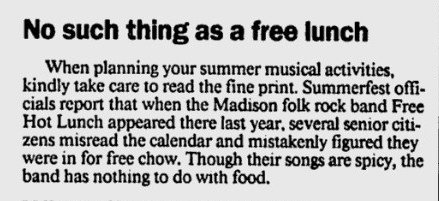
The Milwaukee Journal — Jun 17, 1990
You can purchase some Free Hot Lunch for only $9.49 at Amazon:
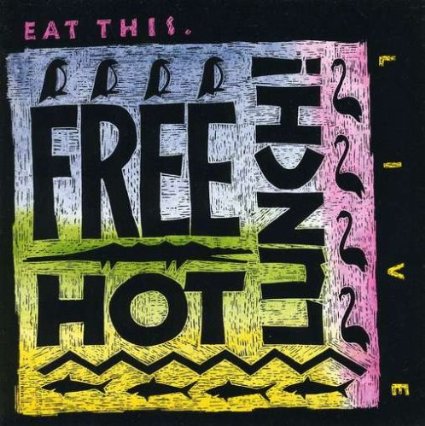
Posted By: Alex - Thu Jan 07, 2016 -
Comments (2)
Category: Food, Music, 1990s
Careers for Girls
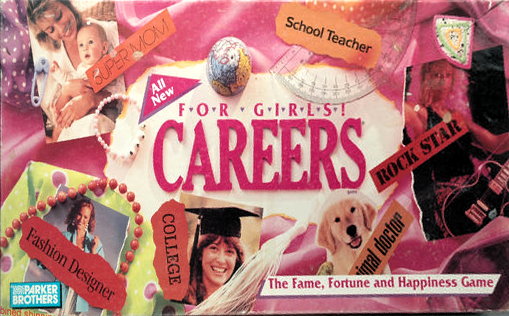
In 1990, Parker Brothers released a new board game called "Careers for Girls" in which players could choose from six jobs: supermom, rock star, school teacher, fashion designer, animal doctor, and college graduate.
By contrast, the career options in the non-gendered version of Careers included things such as Ecology, Teaching, Sports, Computer Science, Space, Show Biz, Big Business, and Politics. (The game was invented in 1955, and the various career options changed over the years.)
Of course, the company got slammed for being sexist and soon discontinued the "for girls" version of the game, claiming a "lack of mass appeal."
The Big Game Hunter blog offers more background on the history of the Careers game and its original inventor, James Cooke Brown (science fiction author and creator of the artificial language, Loglan).
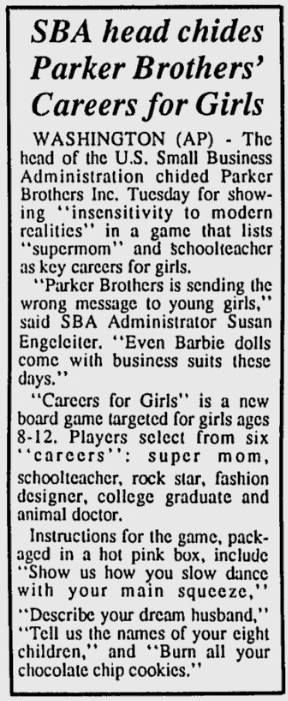
The Southeast Missourian — Nov 26, 1990
Posted By: Alex - Wed Jan 06, 2016 -
Comments (9)
Category: Games, 1990s
The Fainting Woman Sex Case
Classic weird news from 1993. Posted over at about.com.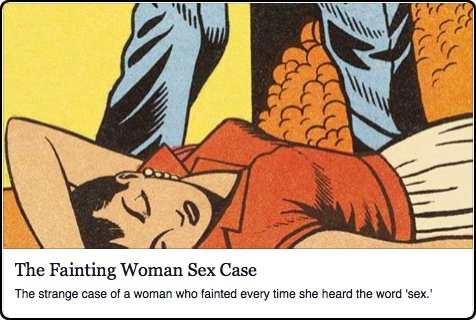
Posted By: Alex - Wed Dec 23, 2015 -
Comments (2)
Category: Crime, 1990s
Rice recipe caused nervous breakdown
1992: Bobbie June Griggs sued South Carolina Electric & Gas, claiming that its publication of her rice recipe caused her to suffer a nervous breakdown. Her husband also brought an action for "loss of consortium."Griggs had entered her rice recipe in the utility's Third Annual Rice Cookoff in 1989. She wasn't picked as a finalist, but the utility nevertheless included her recipe in the cookoff cookbook (Rice, a lowcountry tradition: the official cookbook for the Third Annual South Carolina Rice Cookoff). This is what triggered the nervous breakdown.
The state court dismissed her case, noting that it was really a copyright case and thus belonged in the federal courts. In 1995, the state supreme court affirmed this decision (although one justice dissented). And it seems that Griggs tried to take her case all the way to the U.S. Supreme Court, because the AP reported in April 1996 that the Supreme Court also refused to hear her case, noting that "copyright law does not cover infliction of emotional distress" and also that you can't copyright a single recipe.
Her recipe, which she said she spent 10 years developing, involved canned tomatoes, meatballs, onions and bell peppers on a bed of rice. She called it "June's Creation."

Spartanburg Herald-Journal - Apr 23, 1996
Posted By: Alex - Fri Dec 18, 2015 -
Comments (10)
Category: Food, Cookbooks, Lawsuits, 1990s
Peels and All
June 1997: Mait Lepik won Estonia's first banana-eating contest thanks to a time-saving strategy. Instead of wasting precious moments peeling the bananas, he simply ate the bananas peels and all. His first-place prize was a free trip to the Canary Islands.That's how the story was widely reported back in 1997 (such as here and here and below), but I have a hard time believing that it could be quicker to eat a banana with its peel still on, rather than taking a brief moment to remove the peel. After all, the skin is full of fiber and takes time to chew. I think it should have been reported that he managed to win the contest despite not peeling the bananas first.
In the video below the article, professional competitive eater Kevin Strahle (aka L.A. Beast) eats six unpeeled bananas. It's not easy for him. So I don't see how it could have been an easy way for Lepik to win a banana-eating contest either.
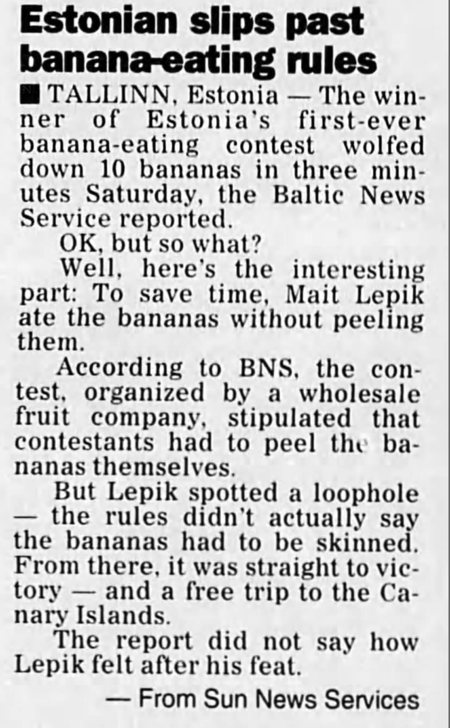
San Bernardino County Sun - June 22, 1997
Posted By: Alex - Thu Dec 17, 2015 -
Comments (12)
Category: Food, Sports, 1990s
Heaveno!
Leonso Canales of Kingsville, Texas began his campaign to replace the greeting "Hello" with the less satanic "Heaveno" in 1988, but he got really serious about it in 1997 when he placed ads in the local paper showing the word "Hello" scratched out and replaced with "Heaveno." That same year, his campaign received official support when the commissioners of Kleberg County voted unanimously to designate "Heaveno" as the county's official greeting.Canales died in Sep 2014, and with his departure the wind seems to have been taken out of the sails of the Heaveno movement. The website heaveno.com has been abandoned (although the old site is preserved in the Wayback Machine).
The Encyclopedia of American Loons includes a brief entry about Canales, and his son posted a memorial to him on YouTube (embedded below).
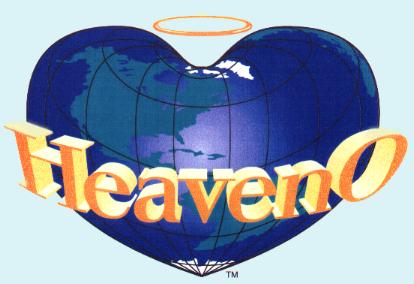
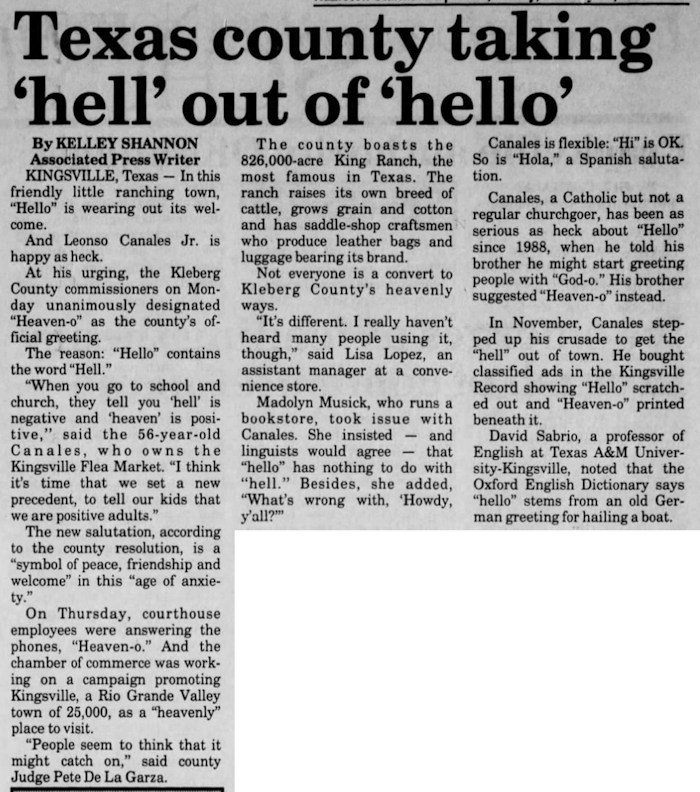
Standard-Speaker (Hazleton, Pennsylvania) - Jan 17, 1997
Posted By: Alex - Mon Dec 07, 2015 -
Comments (5)
Category: Languages, Religion, 1990s
Wrong Signature Montblanc
In the mid-1990s, Montblanc began selling a limited-edition pen engraved with the signature of Alexandre Dumas, author of The Three Musketeers — at a price of $750 for a fountain pen or $375 for the ballpoint version. But in 1996 the company admitted it had made a mistake and recalled all the pens. The engraved signature was from the wrong Alexandre Dumas. Not the author of The Three Musketeers, but rather his not-quite-as-famous son, author of "The Lady With the Camellias.'"The mistake was first noticed by the owner of a pen store in Toronto who was displaying a manuscript in his store that included the signature of the senior Dumas and noticed it didn't match the one on the pen. [More info: Eugene Register-Guard - Oct 6, 1996]
At the time, there was a lot of speculation that the wrong-signature pen would quickly rise in value. But no. Checking on eBay, it seems that both versions of the pen go for about the same price (anywhere from $800 to $2000). Probably because too many of the wrong-signature pens were made to make it a rare item.
There's a discussion of both pens on the Fountain Pen Network.
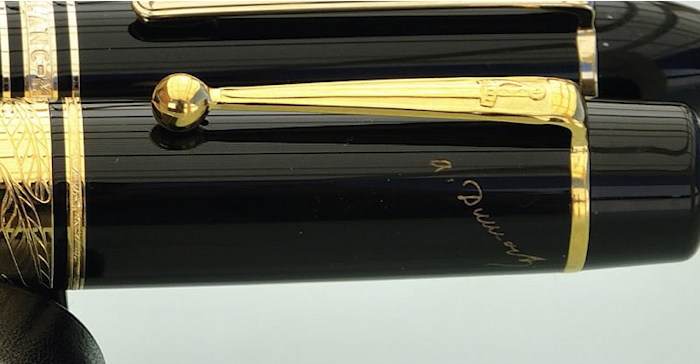
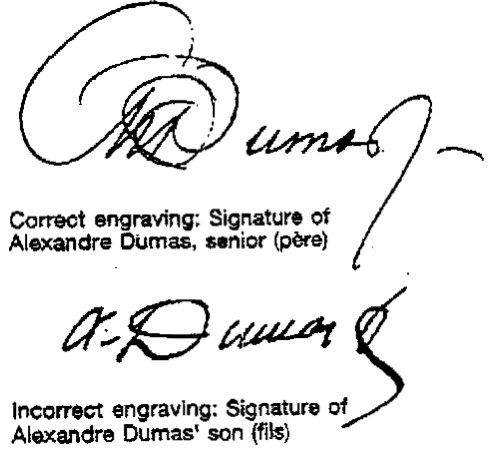
Posted By: Alex - Sun Nov 22, 2015 -
Comments (4)
Category: 1990s, Goofs and Screw-ups
Hog dogs with a message
In 1990, the Viskase Corp. debuted a breakthrough in hot-dog technology. It had developed an edible ink that allowed messages to be printed onto hot dogs during the manufacturing process.As far as I can tell, this technology failed to find a market. The NY Times reported that "the Viskase Corporation found no takers for its offer to print edible-ink ads on hot dogs."
Perhaps this was because a) what kind of message is best delivered via hot dog?, and b) hot dogs are usually covered with condiments, which would hide the message.
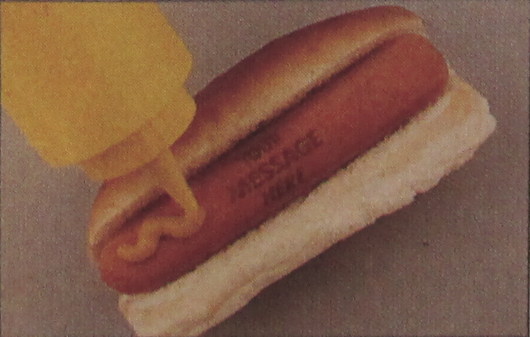
Image source: Newsweek - Jan 22, 1990
Posted By: Alex - Sat Nov 14, 2015 -
Comments (5)
Category: Food, Junk Food, Advertising, 1990s
Condom Hut
Back in 1992, Emanuelle Del Vecchio had an idea for a great new business — a drive-through condom store. She called it "Condom Hut" and set up shop in a former Fotomat booth.Unfortunately the booth was located in an area of Cranston, Rhode Island populated by very Catholic Italian-Americans, many of whom took great offense at the idea of people being able to buy birth control from the comfort of their motor vehicle.
Local residents began protesting the store. The Roman Catholic Diocese of Providence condemned it for "promoting sexual activity, not abstinence." A rock was thrown through its window. Graffiti was spray-painted on its front. And eventually the business folded.
America was just not ready for a drive-through condom store.
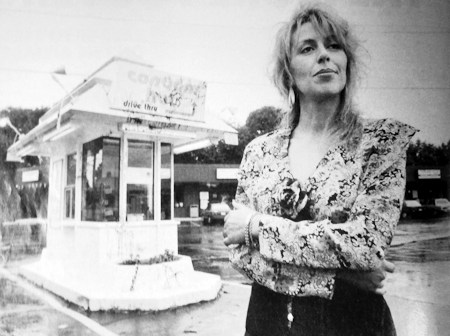
Source: People magazine - Sep 21, 1992
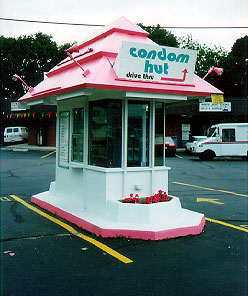
Source (and more info): Quahog.org
Posted By: Alex - Fri Nov 13, 2015 -
Comments (8)
Category: Business, Birth Control , 1990s
Satanic Thomas Guide
The front cover of the 1997 Thomas Guide road atlas for Los Angeles and Orange Counties boasted that the guide that year included "666 new streets."This prompted concerned Christians to start calling the publisher of the guide, fearing that the use of the number 666 was some kind of satanic signal.
Eventually the publisher recalled the Guide and issued a new one, with a revised cover boasting only "665" new streets. A Thomas Guide spokesman said it wanted buyers to "feel confident with the use of our product."
I've found a few of the satanic Thomas Guides for sale on eBay. However, I've been unable to find any of the revised ones.
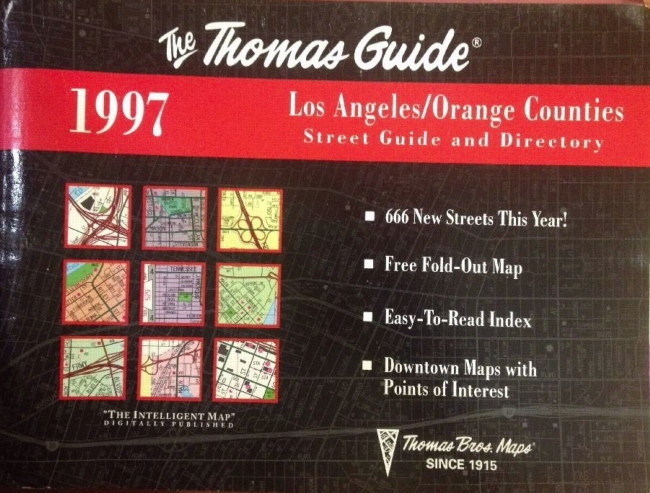
More info: La Times - Oct 28, 1999
Update: I spoke too soon. Using some slightly different search terms, I was able to track down one of the revised (non-satanic) Thomas Guides for sale on eBay.
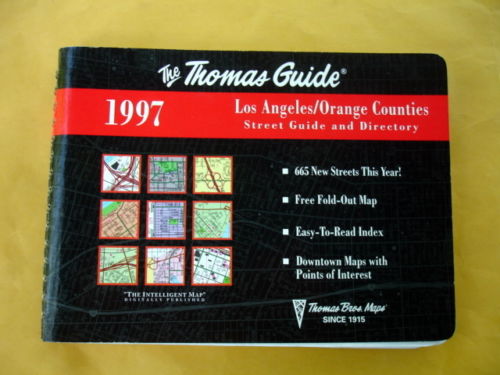
Of course, the revised cover was a bit of a hoax. There actually were 666 new streets, but they were telling people there were only 665. Unless they actually deleted one of the streets from the guide. An appropriate street to delete would have been Devilwood Circle, in Westminster, CA (Orange County).
Posted By: Alex - Thu Oct 29, 2015 -
Comments (18)
Category: Geography and Maps, 1990s

| Who We Are |
|---|
| Alex Boese Alex is the creator and curator of the Museum of Hoaxes. He's also the author of various weird, non-fiction, science-themed books such as Elephants on Acid and Psychedelic Apes. Paul Di Filippo Paul has been paid to put weird ideas into fictional form for over thirty years, in his career as a noted science fiction writer. He has recently begun blogging on many curious topics with three fellow writers at The Inferior 4+1. Contact Us |




